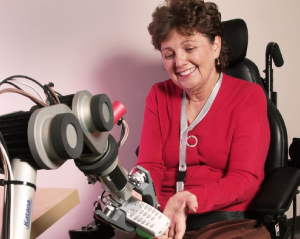Patient care: Focus on quality
A new National Cancer Institute designation (the first in Georgia), a new critical care addition to Emory’s comprehensive care centers (a new regional resource), and numerous new programs and clinical trials keep patient care at Emory growing in strength and impact, with a continually redoubled focus on improving quality and safety. Emory medical faculty provide care in a variety of venues, including those in Emory Healthcare, the largest, most comprehensive clinical system in Georgia.
Add in Emory’s affiliations with Children’s Healthcare of Atlanta, the publicly owned Grady Memorial Hospital, and the Atlanta VA Medical Center, and these faculty are responsible for more than 3.8 million patient services each year,ranging from fetal to geriatric medicine, from preventive and primary care to the most specialized care in the region.
|
In this section |
Winship Cancer Institute was awarded National Cancer Institute Cancer Center designation this year, becoming the first institution in Georgia to be so named and one of only 65 NCI-designated centers nationwide. Winship was established in 1937 with a gift from Coca Cola leader Robert Woodruff, who did not want Georgians to have to leave the state to receive the best cancer care available anywhere. Winship will receive $4.3 million from the NCI over the next three years to grow scientific research and to extend the benefits of that research directly to patients, families, and the general public.
Cancer imaging— The Emory Molecular and Translational Imaging Center also joined the ranks of NCI elite, in this case eight NCI-funded in vivo cellular and molecular imaging centers across the country. The $7.5million grant is designed to develop, validate, and apply molecular imaging biomarkers to detect cancer earlier and more accurately. Projects range from clinical studies on more accurate diagnosis of prostate cancer to basic research on cancer-seeking magnetic iron nanoparticles, conducted by a multidisciplinary team from Emory Winship Cancer Institute and the departments of biomedical engineering, radiology, biostatistics, pathology, urology, and surgery. Emory’s cancer imaging research makes up part of a larger Center for Systems Imaging, which supports scientists across the university who use tools such as MRI and PET.
Atlanta VAMC—The Atlanta VA Medical Center was granted a three-year approval with commendation by the Commission on Cancer of the American College of Surgeons, a designation received by only one in four of all cancer programs at hoTspitals across the country. The Atlanta VAMC is a teaching hospital affiliated with Emory, and its oncology programs are directed by Emory faculty.
The Emory Center for Critical Care (ECCC) became Emory’s newest comprehensive center, joining heart and vascular, cancer, neurosciences, and transplantation as areas of strategic focus and investment. ECCC founding director is trauma surgeon Timothy Buchman. The ECCC is integrating ICUs throughout Emory Healthcare, bringing together clinicians and investigators from diverse disciplines to conduct research to define best clinical practices and inform public health policy. The center also houses Emory’s training programs in critical care anesthesiology, surgical critical care, and pulmonary/medical critical care. Plans are being developed to sponsor critical care training for hospitalists, emergency medicine physicians, and neurologists.
ALS—Resources for treating patients with amyotrophic lateral sclerosis include various ALS-focused neurology, nursing, and therapy specialists whose efforts are augmented by research to develop assisted-living robotic devices and test new drugs. Emory is one of five national centers selected by the Muscular Dystrophy Association as part of a clinical research network to speed and support ALS research. A clinical trial began at Emory in February to test the drug arimoclomol, for patients with rapidly progressive forms of familial ALS. Arimoclomol has been found effective in a mouse model of ALS even when initiated after the onset of symptoms and was found to be safe and well tolerated in a previous phase II trial that included patients with sporadic (nonfamilial) ALS. The current trial aims initially to recruit 30 ALS patients to evaluate drug safety and tolerability and approximately 50 more thereafter.
Diagnosing dementia—Minutes are all it takes to detect mild cognitive impairment and undiagnosed dementia using a new two-part screening instrument developed by Emory neurologists. The three-minute “Mini-Cog” screening test consists of a simple clock-drawing task and an item-recall test for the patient and a short functional activities questionnaire for a family member or close friend to complete. The inexpensive MC-FAQ screening instrument requires no special training to administer or score and has an 83% detection rate, proving at least as accurate as the complex hour-long formal neuropsychological testing currently in wide use. Heart and vascular care Predicting heart failure—Emory cardiologists have found that blood levels of resistin, a hormone produced by fat cells, is one of the strongest predictors of new-onset heart failure yet found. In their study, the risk of new-onset heart failure increased by 38% for every 10 nm/ml increase in resistin levels, making the hormone a stronger predictor of heart failure than C-reactive protein and other inflammatory markers linked to heart disease. Improving angioplasty—Emory cardiologists are testing a “stuttering” modification of angioplasty, which uses balloon inflation to open a narrowed or occluded vessel. The modified angioplasty procedure involves inflating and deflating the balloon several times, avoiding a sudden rush of blood back into the heart after a blood vessel is reopened and thus reducing reperfusion injury.
Predicting heart failure—Emory cardiologists have found that blood levels of resistin, a hormone produced by fat cells, is one of the strongest predictors of new-onset heart failure yet found. In their study, the risk of new-onset heart failure increased by 38% for every 10 nm/ml increase in resistin levels, making the hormone a stronger predictor of heart failure than C-reactive protein and other inflammatory markers linked to heart disease.
Improving angioplasty—Emory cardiologists are testing a “stuttering” modification of angioplasty, which uses balloon inflation to open a narrowed or occluded vessel. The modified angioplasty procedure involves inflating and deflating the balloon several times, avoiding a sudden rush of blood back into the heart after a blood vessel is reopened and thus reducing reperfusion injury.
 |
|
|||
| |

